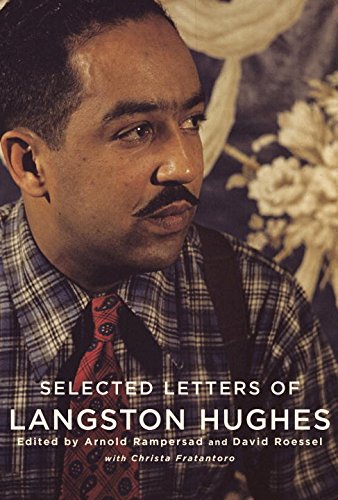
 This week’s Sunday Read is a review of Selected Letters of Langston Hughes by Langston Hughes, edited by Arnold Rampersad and David Roessel, with Christa Fratantoro. The read also includes an excerpt from the book and one of Hughes’ most well-known poems.
This week’s Sunday Read is a review of Selected Letters of Langston Hughes by Langston Hughes, edited by Arnold Rampersad and David Roessel, with Christa Fratantoro. The read also includes an excerpt from the book and one of Hughes’ most well-known poems.
Hughes (1902–1967) is thought of by many as the central poet the Harlem Renaissance. He saw himself as a scribe of the negro people, and dutifully recorded the experience, culture and rhythm of African American life. For this he was highly regarded by ordinary people and scholars alike.
Hughes grew up feeling isolated, and did not have a comfortable family life. But, as Gwendolyn Brooks, in his 1986 review of the biography The Life of Langston Hughes by Rampersad, says “Who he was is a smallish part of what he was”. He was a hugely important poet, and still is.
The poem “Theme for English B”, shared by the Poetry Foundation, demonstrates how Hughes regarded his identity as intertwined with that of the community around him. Read the poem:
It’s not easy to know what is true for you or me
at twenty-two, my age. But I guess I’m what
I feel and see and hear, Harlem, I hear you.
hear you, hear me—we two—you, me, talk on this page.
(I hear New York, too.) Me—who?
Hughes used language to establish connections with his community. In her review of Selected Letters of Langston Hughes for the LA Times, Lynell George draws a connection between his work as a poet and his writing as a correspondent:
Hughes had been set afloat, estranged early on from his immediate family. Writing was his way of creating community. Letters weren’t incidental; the sheer volume of correspondence sometimes became the subject of the missive itself: “I got 30 letters today, which took me all day to read and answer….” Though the ritual crowded into his workday, these letters weren’t tools of procrastination, they were lifelines.
Mail arrived from many corners of the black experience — from the first bloom of Harlem Renaissance stretching well into the trenches of civil rights era. The specific details and texture found within them granted him entree — and lent him gravitas as an informed eyewitness who helped to shape a deeper understanding of blackness in a global sphere.
Hughes believed that writing was the only place that his was really free. NPR Books has shared an excerpt from a letter to Charlotte Mason, his godmother, in which he explains the deficiency of freedom in other spheres of his life:
In all my life I have never been free. I have never been able to do anything with freedom, except in the field of my writing. With my parents, with my employers in my struggle for food, in all the material circumstances of life, I have been forced to move this way and that — only when I sat down for a moment to write have I been able to put down what I wanted to put down, to say what I’ve wanted to say, when and where I choose …
- Last week’s Sunday Reads: Announcement of Harper Lee’s New Novel Go Set a Watchman Sparks Ethics Debate and In Celebration of Andre Brink
Book details
- Selected Letters of Langston Hughes by Langston Hughes, edited by Arnold Rampersad and David Roessel, with Christa Fratantoro
EAN: 9780375413797
Find this book with BOOK Finder!